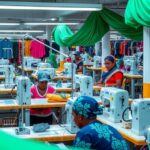Economy
Politics
ANWAR HOSSAIN, ASIA, BANGLADESH, BANGLADESH GARMENT MANUFACTURERS AND EXPORTERS ASSOCIATION, BASH, BASHIRUDDIN, CHINA, DONALD TRUMP, ECONOMY, FOREIGN INVESTMENT, INFLATION, KHALILUR RAHMAN, MEXICO, MUHAMMAD YUNUS, NATIONAL BOARD OF REVENUE, NORTH AMERICA, RA, RAHMAN, RAKIBUL ALAM CHOWDHURY, RDM GROUP, SHEIKH BASHIRUDDIN, STATE DEPARTMENT, TOMMY HILFIGER, TRADE, TRADE DEFICIT, UNITED STATES, US, YUN, YUNUS
Sophia Klein
Bangladesh Holds Emergency Talks on U.S. Tariffs Affecting Garment Industry
Bangladesh’s interim leader called an emergency meeting after the U.S. imposed a 37 percent tariff on textiles, a crucial industry factoring 80 percent of exports. While officials are in talks with U.S. representatives, concerns emerge about potential trade losses and the industry’s readiness for the tariffs’ effects.
Bangladesh’s interim leader, Muhammad Yunus, convened an emergency meeting on Saturday to address the challenges posed by new tariffs imposed by the United States on the country’s textile sector. These tariffs, which now stand at 37 percent for cotton and 32 percent for polyester products, have been deemed a “massive blow” by textile leaders in the nation, which is the world’s second-largest garment producer.
The textile and garment industry accounts for approximately 80 percent of Bangladesh’s exports and is vital to its economy. Following a difficult period after a political revolution, the industry is in a period of rebuilding. Annually, Bangladesh exports around $8.4 billion worth of garments to the United States, representing roughly 20 percent of its total ready-made garment exports.
In response to the tariffs, Yunus plans to engage with the U.S. administration, as conveyed by Sheikh Bashiruddin, the commerce minister. Despite expressing concerns, Bashiruddin suggested that the impact may not be as severe compared to other competitors facing even higher tariffs.
Khalilur Rahman, Yunus’ advisor, mentioned that the government had anticipated the tariff increase and had been in discussions with U.S. officials since February. He indicated these discussions are ongoing and necessary actions will be determined based on the outcomes of these talks.
The National Board of Revenue, Bangladesh’s tax authority, is also expected to meet to analyze the repercussions of the tariffs. Rakibul Alam Chowdhury, Chairman of RDM Group, emphasized potential trade losses, stating that the industry risks losing buyers to more cost-competitive markets.
Anwar Hossain, BGMEA administrator, expressed that the industry was “not ready” for this adverse outcome. As Bangladesh manufactures garments for renowned global brands, including major U.S. companies such as Gap Inc., Tommy Hilfiger, and Levi Strauss, the stakes are particularly high for the textile sector.
In conclusion, the imposition of new tariffs by the United States poses significant challenges for Bangladesh’s vital garment industry. The interim government is taking proactive measures by convening emergency meetings and engaging with U.S. officials. While some leaders believe the impact may be manageable compared to competitors, concerns remain about the industry’s readiness for these changes and the potential loss of trade.
Original Source: homenewshere.com








Post Comment